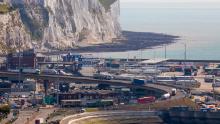Brexit: UK delays border controls to soften blow to crashing economy
Under the new border arrangements, UK businesses importing standard goods from the European Union, such as electronics and clothes, will be allowed to defer full customs declarations and any tariff payments for up to six months. Plant and animal products, such as meat, honey, milk and eggs, will be subject to customs checks starting in April. By July, companies will have to make full declarations and pay tariffs at the point of importation.
The government said in a statement that its approach will “give industry extra time to make necessary arrangements.”
The policy reversal comes after UK business groups pushed in recent weeks for more clarity on border arrangements and the terms of future trade with the European Union, warning that companies already weakened by coronavirus fallout won’t be able to withstand another shock.
“The logistics industry is extremely grateful for the measures announced by the UK government to stage the introduction of new trading arrangements,” Elizabeth de Jong, policy director at the Freight Transport Association, said in a statement. “They have listened to our concerns and made allowances to enable our sector to recover from the Covid-19 pandemic and plan effectively so that we can continue to trade effectively with Europe,” she added.
The government also announced that it would build new border facilities, including at ports and inland sites, so that customs checks can be carried out, and unveiled a £50 million ($63 million) package to better enable customs intermediaries, such as brokers, freight forwarders and parcel operators, to prepare.
The biggest crunch point is expected to be the English Channel crossing between Dover and the French town of Calais. The port of Dover handled 2.5 million trucks in 2018 and another 1.7 million passed through the nearby Eurotunnel under the channel.
Double whammy ahead?
Britain is in a precarious economic position.
British companies have borrowed nearly £35 billion ($44.4 billion) so far under government coronavirus relief programs, according to figures released Tuesday by the UK Treasury. And nearly 9 million people — about 27% of the workforce — are relying on the state to pay all or part of their salary at a cost of £19.6 billion ($22.2 billion) thus far.
Now fears are rising that businesses could face a one-two punch from coronavirus and cutting its remaining ties with the European Union without a deal in place to protect trade. Talks on a new trade agreement have made little progress.
“Negotiators seem to be stuck at an impasse and are far apart on key issues such as governance, level-playing-field rules, fishing and, critically, the Northern Irish border,” economists at Berenberg Bank said in a note Friday.
The Organization for Economic Cooperation and Development expects the UK economy to shrink by 11.5% this year even if a basic free trade agreement with the European Union is reached, and a second wave of infections is avoided.
A sharp increase in coronavirus cases coupled with a costly final exit from the European Union would only produce a deeper slump.
— Luke McGee contributed reporting.



